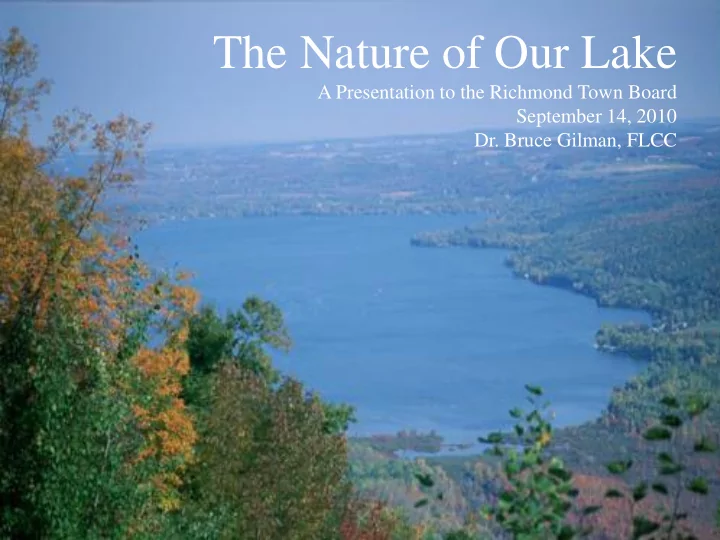

The Nature of Our Lake A Presentation to the Richmond Town Board September 14, 2010 Dr. Bruce Gilman, FLCC
Summer 2010 Regional Algal Blooms Cayuga Lake Waneta Lake Sodus Bay Conesus Lake
Sandy Bottom Beach Closed August 29, 2010 Images by Steve Barnhoorn
Gleotrichia Anabaena Microcystis
What are cyanobacteria? Formerly known as blue-green algae Primitive, single celled organisms that can grow as filaments, chains or loose colonies Often surrounded by a gelatinous matrix Naturally present in lakes and streams, usually in low numbers Can form large scum layers, blankets and mats across the water surface
Why be concerned about cyanobacteria? May cause taste and odor problems in drinking water Some strains produce toxins that can be harmful in significant concentrations Blooms of cyanobacteria disrupt normal lake ecology, and large amounts of dissolved oxygen are consumed from the water when they decompose
Why have cyanobacteria become more common in recent years? Zebra Mussel Population Structure Honeoye Lake 50 45 40 35 30 percent 25 20 15 10 5 0 0 to 4.9 5.0 to 9.9 10.0 to 14.9 15.0 to 19.9 20.0 to 24.9 25.0 to 29.9 shell size class (mm)
What influences the growth of cyanobacteria? These organisms respond to: warm water (hot summer days) sun light the nutrient phosphorus calm, stagnant water conditions
Phosphorus Cycle in Honeoye Lake Increases in phosphorus Internal loading of “legacy” phosphorus External loading from watershed and atmosphere Decreases in phosphorus Chemically bound in deep,frequently anoxic bottom substrate Removed in mechanically harvested plants Lost downstream through lake outlet
Runoff, Wind Fertilizer, Detergent, Outlet, Waste Harvested Absorbed by plants plants Bottom precipitation or release
Honeoye Lake and Watershed, 1940’s
Recommend
More recommend